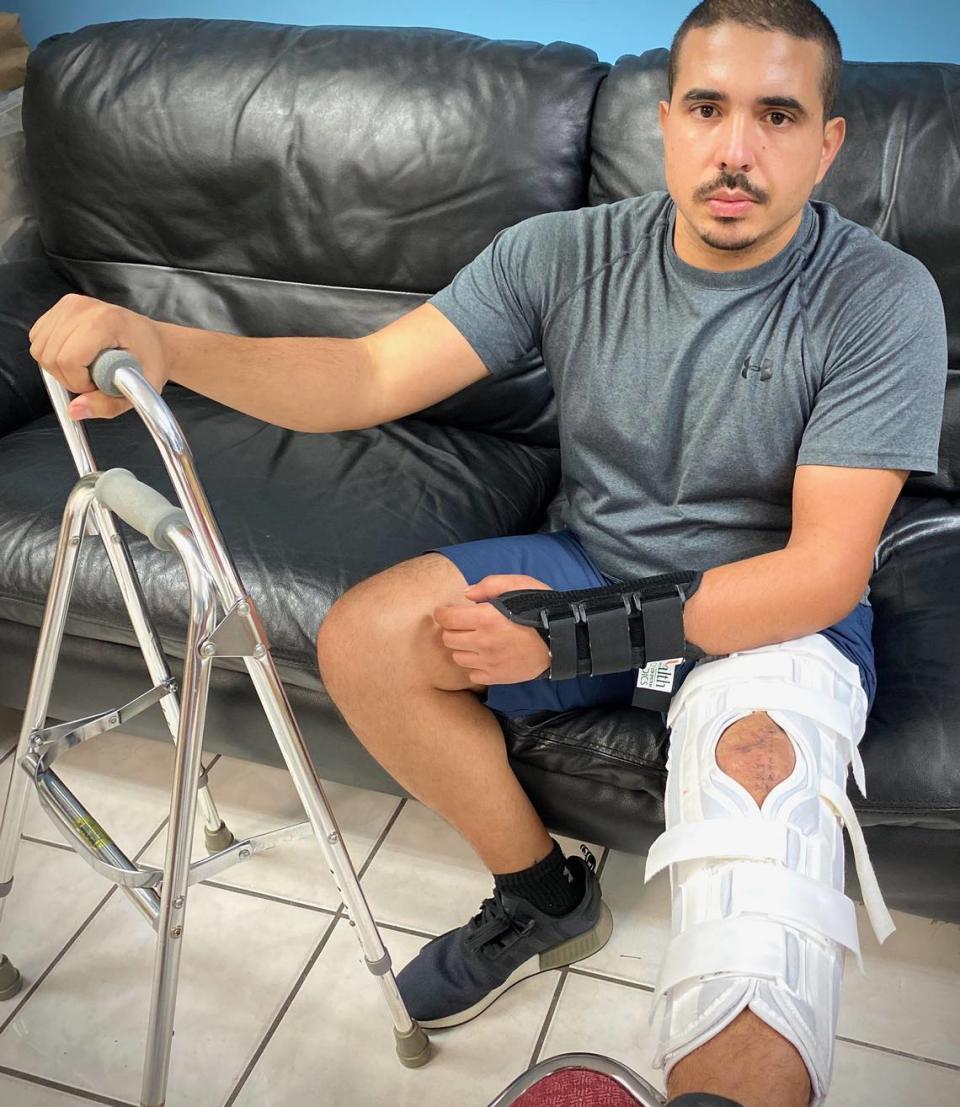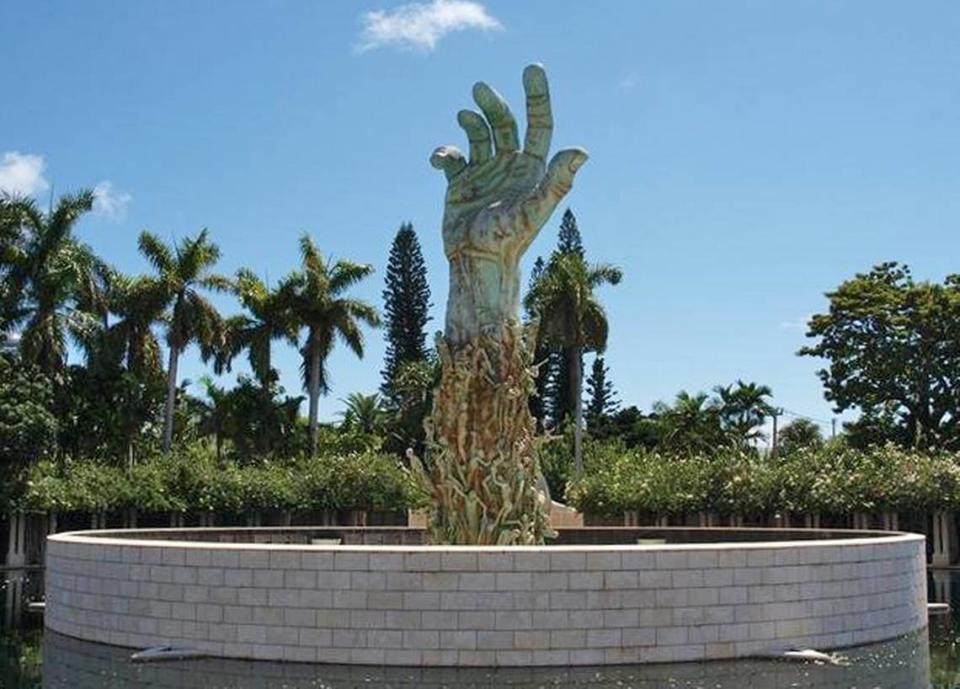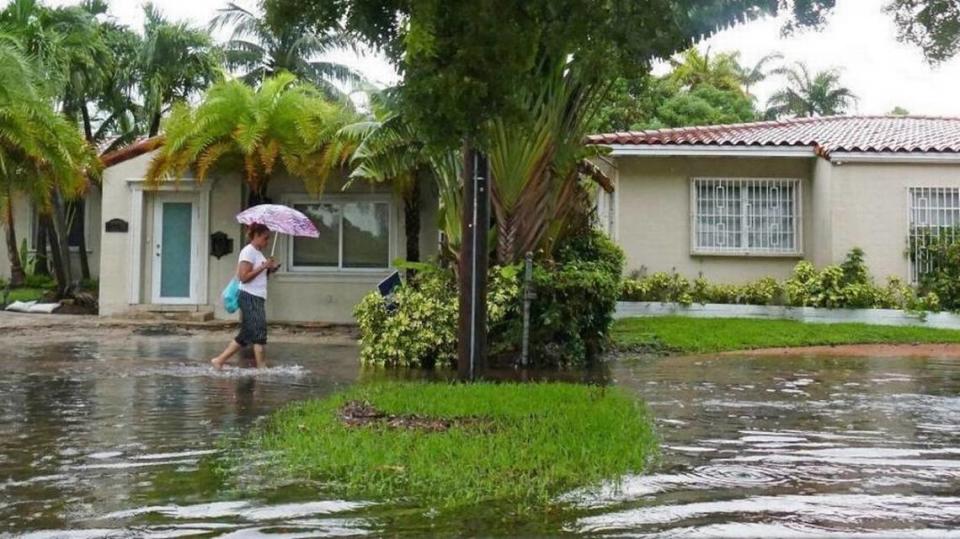Miami Beach mayor: ‘The state of our city remains strong and getting stronger’
- Oops!Something went wrong.Please try again later.
Miami Beach Mayor Dan Gelber spent much of his State of the City speech Monday discussing ways his administration has worked to improve residents’ quality of life with more parks, cultural experiences and enhanced public safety.
Gelber touted the 57 parks, infrastructure and public safety projects that are now fully funded after voters in 2018 approved $439 million in general obligation bonds.
“When residents approved the general obligation bonds with 70% support, you did so with the promise that the city would deliver these quality of life enhancements in a timely and transparent manner,” he said. “We take that promise seriously.”
The bond program is helping fund the city’s green-space “renaissance,” Gelber said, with the city on its way to adding more than 30 acres of new park space around the city and upgrading 20 existing parks.
A planned park at the site of an old par-3 golf course in the Bayshore neighborhood near Miami Beach Senior High School will account for 19.5 acres of that green space. Gelber said the city will break ground on the park by the end of the year.
Bayshore Park will have a central lake and boardwalk, six tennis courts and a dog park. It’s designed with environmental remediation measures to help naturally reduce storm water runoff, he said. It will include 259 additional trees and a playground.
Gelber touted the city’s efforts to open parks near the convention center, at Pride Park and the Collins Canal Park, and in North Beach at Altos del Mar.
“Parks provide recreational opportunities, preserve property values and, most importantly, give family and friends (and their pets) beautiful spaces in which to share common experiences,” Gelber said. “And in our city, where many residents don’t have yards, they are especially vital.”
A legal settlement at the Feb. 12 commission meeting ensures that developers will build a new three-acre park at the entrance to South Beach on Alton Road. Up to $9.6 million in bond money is going into the construction of a colorful pedestrian bridge to span the MacArthur Causeway near Fifth Street and Alton Road.
While the city’s beaches are not technically considered parks, Gelber said the city prioritizes their maintenance and improvement as if they were green spaces. He said the city’s plan to build an uninterrupted beach walk from 88th Street to South Pointe Park will be complete by early 2022. Construction of the last sections to be replaced, from 24th Street to 45th Street, is under way and expected to be completed by spring of 2021. The final section of beach walk in North Beach will be completed by 2022, he said.
Public safety
Ahead of a vote on Wednesday to move up “last call” at South Beach bars for spring break, Gelber expressed concerns about turning Ocean Drive into Bourbon Street.
He spoke about efforts the city has undertaken to curb excessive partying in the entertainment district, like requiring that bars hire off-duty officers and “eliminating” promoted parties.
“During the Super Bowl the entire world saw how uniquely stunning Ocean Drive can be. But Ocean Drive — and our entire entertainment district — sometimes doesn’t meet expectations,” he said. “Too often it feels like Bourbon Street or a place where anything goes.”

Miami Beach Police Officer Ricardo Castillo, who was stabbed on Ocean Drive in January, sat in the crowd on Monday as Gelber thanked Castillo and the department’s other 415 officers.
While noting that recent FBI data shows overall crime decreasing in Miami Beach, Gelber said that the influx of millions of visitors every year can pose dangers to residents and tourists.
“Part of the challenge is to make sure our efforts to protect our tourists don’t cause us to neglect our residential communities who have an understandable expectation that our neighborhoods should be crime-free,” he said.
Among the new programs the police department has rolled out under new Chief Rick Clements, Gelber highlighted the formation of a Community Affairs Unit and new high-visibility patrolling practices in busy areas.
Gelber mentioned the city’s efforts to improve bicycle safety as well, a few months after the death of a local chef on the Venetian Causeway. The commission voted on Feb. 12 to approve, in concept, support for a multi-jurisdictional effort to upgrade the bike lanes.
Holocaust Memorial
Among the city officials, employees and residents in attendance at the New World Center on Monday, Gelber singled out three: Holocaust survivors Lazlo Selly, David Mermelstein and Fred Mulbauer.
Thirty years after the city’s Holocaust Memorial Miami Beach was dedicated, Gelber said he feels duty-bound to expand the memorial “in size and mission” after he was approached by Norman Braman and Ezra Katz, local businessmen and founding members of the memorial.

“Recently the Braman and Katz families and others reached out to discuss a plan to expand the memorial in size and mission so it can have a more active and relevant presence in a world where hate, clearly, still exists,” Gelber said. “A modest expansion would give it the bandwidth to take a greater role in education and outreach to the entire community, combating hatred of all kinds — giving it a vitality at a time when all communities must speak out against hate.”
Rising seas, rising streets
There is no “pause” in the city’s fight against rising seas, Gelber said, using a term that his critics have weaponized. To those critics, like Commissioner Ricky Arriola, the city has “studied to death” the issue of climate change. Instead of taking decisive action, the city has hired experts to study the issue and bring back recommendations.
Several experts have told the city that in order to keep Miami Beach dry — and insurance premiums low — roads will need to be raised. The most recent findings from Jacobs Engineering, presented to the commission in January, indicated that the longer the city waits to elevate its streets, the more it will cost.

“We cannot push this issue to the bottom of our inbox. And there is no pause,” he said. “We are simply informing our program with new information.”
Residents have consistently bristled at the idea of raising roads, pointing to years-long construction timelines and instances of water overflowing from higher roads onto their property.
But Gelber said the scientists are right. Now it’s time for the city to develop an updated “action plan” with community input, he said.
“We don’t have the luxury of converting this into a political debate,” he said. “For me the only thing we should care about is what is the best science and engineering available to guide our decision-making.”

